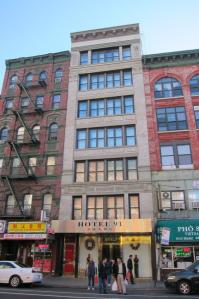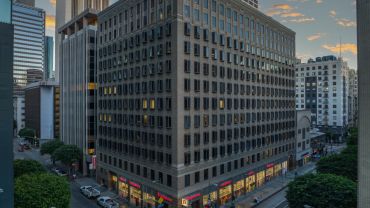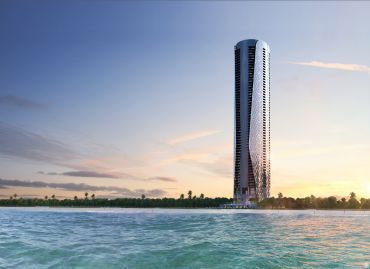
In the immediate aftermath of the terrorist attacks on Sept.11, 2001, Chinatown was floundering. Only 10 blocks from ground zero, the immigrant enclave was without telephone service or public transportation. Thousands of residents were out of work and garment factories, once a critical component of the local economy, shut their doors. There was grave concern that the area, like rest of Lower Manhattan, would be unable to recover.
Yet today, Chinatown is experiencing a boom in hotel development that would have been unfathomable 13 years ago. A host of factors have contributed to this development, including the neighborhood’s proximity to popular tourist attractions, including Soho, the 9/11 Memorial and nightlife hotspots on the Lower East Side, and the dearth of rooms available in the five boroughs for Gotham’s 55 million annual visitors.
“It makes sense that the hotel industry is growing in Chinatown, because it’s both a fantastic, welcoming community and a relatively central neighborhood that’s within easy walking distance of all our great tourist destinations in Lower Manhattan,” said New York City Council Member Margaret Chin, who represents the area.
New York City’s shortage of affordable lodging options for visitors is acute. Last week, The New York Times ran an article on the trend of Chinese visitors touring the Big Apple but being forced to sleep across the river in New Jersey.
In New York City, “the price point is so high and the supply is so limited,” said Wellington Chen, the executive director of the Chinatown Partnership and the Chinatown Business Improvement District. “If we have more reasonable rates, tourists could help the Chinatown economy instead of staying in Newark, N.J.”
Mr. Chen said that the construction of hotels in Chinatown is simply a result of supply and demand.
“When the city tried to pitch the [2012 Summer] Olympics, they realized there [were] not enough hotel rooms for the Olympics,” he noted. “If the city is fortunate enough to win the 2016 Democratic National Convention, Chinatown hotels will be needed” because there are not enough rooms immediately surrounding the Barclays Center.
Though Chinatown has its share of economy chains, including a Best Western, a Howard Johnson and a Comfort Inn, most of the hotels are boutique with a maximum of 100 rooms. Hotel 91, which opened at 91 East Broadway in 2008, has 70 rooms. Hotel Mulberry, established in 2010 at 52 Mulberry Street, has 34 rooms. Hotel Azure at 120 Lafayette Street has only 28 rooms.
“These are not the large hotels that you go to in Las Vegas,” Mr. Chen stressed. “Instead of building one giant hotel, there are four hotels in Chinatown. But it’s important to count the rooms.”
Because the neighborhood is largely comprised of 18th and 19th century tenement-style buildings, the development sites tend to be small. Also, much of the area is still zoned for manufacturing, which prohibits the construction of housing. Because of this, and because the New York metro area’s hotel market is attractive to global investors, hotels provide an enticing alternative to developers.
“Emerging submarkets like Chinatown offer developers a slightly lower buy-in, and also provide visitors with a unique ‘neighborhood feel’ that differs distinctly from traditional tourist hubs like Times Square,” said Andrew Posil, director of sales for hospitality at Massey Knakal Realty Services.
And there are more accommodations to come. According to PricewaterhouseCoopers‘ Manhattan Lodging Index’s second quarter report, new hotels will be cropping up on Grand Street, Canal Street and Bowery in 2015.
Ms. Chin hopes that many of the tourists visiting sites in Lower Manhattan will come to appreciate the community as its own attraction.
“Thirteen years after 9/11, Lower Manhattan is coming back… There’s excitement and vibrancy down there. We hope to really get more of those visitors to visit Chinatown and Little Italy,” she said. “We welcome new customers to come and patronize our businesses.”


